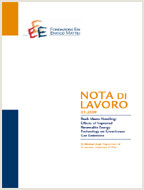Effective Environmental Protection in the Context of Government Decentralization

19.01.2011
ZhongXiang Zhang
Q53, Q56, Q58, Q43, Q48, H23, H75, R51
Effective Environmental Protection, Incentive Structure, Economic Instruments, Industrial Policy, Financial Institutions, Government Decentralization, China
Climate Change and Sustainable Development
Carlo Carraro
China has shifted control over resources and decision making to local governments and enterprises as the result of the economic reforms over the past three decades. This devolution of decision-making to local levels and enterprises has placed environmental stewardship in the hands of local officials and polluting enterprises who are more concerned with economic growth and profits than the environment. Therefore, effective environmental protection needs their full cooperation. Against this background, this paper discusses a variety of tactics that China’s central government has been using to incentivize local governments, and a number of market-based instruments, supporting economic policies, environmental performance ratings and disclosure and cooperation with financial institutions to promote long-lasting, improved corporate energy-saving and environmental performance. It concludes that there is a clear need to carefully examine those objective and subjective factors that lead to the lack of local official’s cooperation on the environment, and provides some suggestions for appropriated incentives to get their cooperation.
